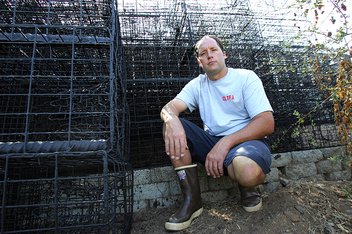
San Diego lobster fisherman Shad Catarius (no relation to the spawning fish) supports an annual trapping tax of of $300 currently before the California legislature. The tax on the $7.8 million annual spiny lobster market would raise the cost for Catarius to make a living on his boat McGhee Marie.
In a San Diego Union-Tribune story, Catarius single- handedly makes the argument for sustainable resource management in business:
“No commercial fisherman wants to be the guy who catches the last lobster.”
Apparently, even during a recession, Catarius (top) is not alone in wanting to pay in to preserve his livelihood. A UC Santa Barbara study found that 58% of fisherman surveyed support the $300 tax to increase the sustainability of the fishery. The spiny lobster fetches between $10-$15 a pound during its peak season in Southern California waters, which in per catch terms means that this would raise overhead by roughly 24 lobsters.
 The Governator has been opposed to the tax, and the state is claiming that the revenue created would not sufficiently fund a robust conservation program with lasting impact.
The Governator has been opposed to the tax, and the state is claiming that the revenue created would not sufficiently fund a robust conservation program with lasting impact.
This is the rare moment in the US when the operators of an industry, albeit a quiet majority, are demanding pragmatic conservation action and more importantly, are willing to pay for it. And while $300 may not be the right market clearing price to preserve the spiny lobster, it certainly cannot hurt. So what to do absent public policy?
San Diego seafood restaurants should work with lobster fisherman to raise awareness. Perhaps an informal certification can be created that is only granted to lobster fisherman that support the tax. If consumers and producers get together, Sacramento will have little choice but to join.


The last lobster? How about the lobster that represents the straw that broke the camel's back…
Once you hit a point, the population will not be sustainable and they will be farmed out of existence – this is what anti-conservationists don't get. They like to eat their lobster but they don't consider what it takes to get it to their plate…
The last lobster? How about the lobster that represents the straw that broke the camel's back…
Once you hit a point, the population will not be sustainable and they will be farmed out of existence – this is what anti-conservationists don't get. They like to eat their lobster but they don't consider what it takes to get it to their plate…